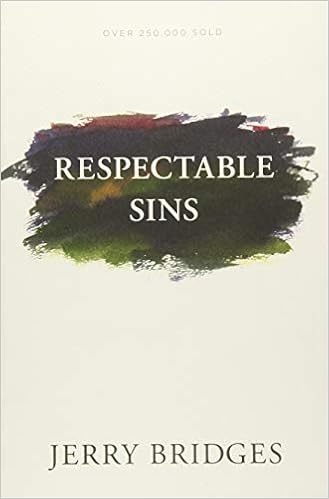It is quite possible that though He is grieved by our sin (see Ephesians 4:30), He may even use that sin to humble us and to exercise us to cry out to Him with a sense of greater dependency.
Bridges, Jerry. Respectable Sins (p. 38). NavPress. Kindle Edition.
Note: The path I am taking today may not be what the author had in mind with this quote.
What role does God play in sin (I will use the word evil, which may or may not have the same thought)? Before you jump on high horse, let's think about some things...
- If God is the creator of all things, did he create evil (sin), or does it just exist as the opposite of good?
- Can we even have or define good without the existence of evil?
- What control does God exhibit in the amount of evil in creation?
- What is the difference between God causing something evil to happen and God allowing something evil to happen?
- Why would God use sin to bring us closer to him?
Now I will share some thoughts, feel free to disagree.
- If God is the creator of all things, did he create evil (sin), or does it just exist as the opposite of good?
- This is one I could go either way on. Good and evil are words that we use because we need to define things in a specific and understandable way. But who is to say that the true definitions of good and evil are not way beyond our ability to comprehend.
- Speaking linguistically, aren't good and evil verbs? Verbs we use to label an action. "That was an evil deed." So the deed was labeled evil, most likely because of the context, but the deed itself in not created evil. We label cancer as an evil deed, but is the creation of cancerous cells evil without the context?
- Evil can be a noun when we speak of it as a thing. "There is too much evil in the world." But in this case, that determination becomes subjective, because often by evil we mean things that we don't like. To some, abortion is a terrible evil, to others it is not an evil at all, just a choice. So once again, the evil is defined by the item or items it is associated with.
- When looking at this in regard to sin, the same argument holds. The action itself may or not be sin depending on the context. Killing is a sin if you kill your neighbor to rob him. But killing in a war would not be considered sin by many.
- Can we even have or define good without the existence of evil?
- Define cold. It is the absence of heat. If you do not understand heat, can you really understand cold? I think of good and evil the same way. Without evil, can we understand goodness? Can we appreciate light without darkness? To what extent must we experience darkness to understand light? How do you quantify darkness without light?
- What control does God exhibit in the amount of evil in creation?
- If God is sovereign, then He is in control of everything. But does He allow some things to happen without His say so? Again, tough question. We do see God in the Bible telling David that his son would die because of his sin. Some would call that evil. But God cannot do evil, so either our understanding of evil is off, or our understand of God is. I say the former.
- What is the difference between God causing something evil to happen and God allowing something evil to happen?
- Again, we first have to define evil. Were the 12 plagues evil? God caused them. But He did so to bring about a purpose. Cancer, injury, death, poverty, what exactly is God's role and does this alter my responsibility? More questions, no answers.
- Why would God use sin to bring us closer to him?
- Because God is in control of all things. Maybe, just like standing outside of time, God stands outside of good and evil as the one in control, causing things to happen according to His will. When God puts something into action, it is His purpose that defines the goodness or evilness of that action. Like when a parent disciplines a child. Yelling at a child with no context would be considered evil, but yelling at a child who was about to tough a hot stove should not be thought of the same way. We cannot often, if ever, see the big picture of what God might be doing.
Okay, random thoughts today, but something I think many struggle with at times. My brother once said he could not worship a god who allows children to starve. I once heard a preacher say that God does not kill children, and he could not worship a god who did. I think we need to be careful of the way that we view God!

No comments:
Post a Comment